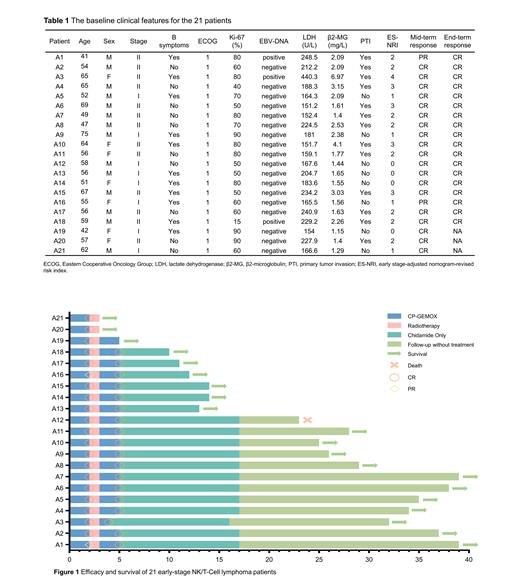Background: Extranodal NK/T-cell lymphoma, nasal type (ENKTL-NT) is a highly invasive tumor with a short doubling time and poor prognosis. Clinically, it usually involves the upper aerodigestive tract and mainly presents with early-stage. Initially, intensity modulated radiation therapy (IMRT) has been considered the preferred first-line therapy for early-stage ENKTL due to its high response rate. In recent years, more and more studies show that adding chemotherapy, especially asparaginase (ASP)-based regimens, provide survival benefit in early-stage patients. However, the optimal chemotherapy regimen has not been fully defined. Epigenetic regulatory mechanisms related to histone deacetylase (HDAC) have been found to play a role in the evolution and progression of ENKTL. Chidamide, a new HDAC inhibitor, has been confirmed to be effective and tolerable to treat lymphoma. Recently, Xue et al showed that chidamide in combination with cisplatin, etoposide or gemcitabine showed synergistic effect and reversed the chemotherapy resistance in the relapsed/refractory B-cell lymphoma. Here, we investigate the safety and efficacy of adding chidamide to a sandwich protocol, P-GEMOX (pegaspargase/gemcitabine/oxaliplatin) regimen (CP-GEMOX) combined with IMRT as first-line treatment in early-stage ENKTL-NT patients.
Methods: We retrospectively reviewed data of early-stage ENKTL-NT patients in the first affiliated hospital of Soochow University from March 2020 to April 2023. A total of 21 patients diagnosed with early-stage (stage Ⅰ or Ⅱ) ENKTL-NT were enrolled and treated with 2 cycles of CP-GEMOX followed by IMRT and 1 or 2 cycles of CP-GEMOX sequentially as consolidation. After consolidation, chidamide was administrated as a maintenance therapy for 1 year. In the induction therapy phase, chidamide was administered orally at a dose of 20 mg twice a week for two weeks, with a one-week discontinuation period; During the maintenance treatment phase, the original dose of chidamide was still maintained and used without pause. The baseline clinical features for the 21 patients were summarized in Table 1.
Results: Among 21 patients, 14 were males and 7 were females, and their median age was 57 (range, 41-75) years. Elevated lactate dehydrogenase, elevated β2-microglobulin, stage II disease and primary tumor invasion were present in 4.8% (1/21), 19.0% (4/21), 61.9% (13/21) and 61.9% (13/21) patients. According to the early stage-adjusted nomogram-revised risk index, the majority of patients (76.2%, 16/21) were classified into intermediate- (1-2) and high (≥3) risk groups. The baseline clinical features for the 21 patients were summarized in Table 1.
During treatment, all patients were well-tolerated and the most common adverse events were hematological toxicities with neutropenia, thrombocytopenia and anemia. Among non-hematological adverse events, nausea, vomiting and reduced appetite were most common. Other side effects included coagulation dysfunction, skin reaction, diarrhea, serum amylase and alanine aminotransferas /aspartate aminotransferase /bilirubin elevation. No anaphylactic reaction to pegaspargase, hemophagocytic syndrome, pancreatitis or sepsis were observed during chemotherapy. Some patients had mucositis and xerostomia when receiving local radiotherapy. All side effects could be reversed with proper treatment, and there were no therapy related mortality. All patients completed 2 cycles of CP-GEMOX, 19 patients achieved complete remission (CR) and 2 patients achieved partial remission (PR) with a CR rate of 90.5% (19/21) and overall response rate (ORR) of 100.0% (21/21) after 2 cycles of CP-GEMOX. Among the 21 patients, 18 patients completed treatment and CR rate was improved to 100.0% (18/18), giving an ORR of 100% (18/18). After a median follow-up of 25.6(range, 2.6-39) months , all patients were alive except one patient relapsed 20 months after treatment and died of COVID-19 related pneumonia 1 month later. The 2-year progression-free survival and overall survival were all 91.5% (Figure 1).
Conclusions: This study demonstrates that sandwich CP-GEMOX chemoradiotherapy is a safe and promising approach to managing patients with early-stage ENKTL-NT.
Keywords: Extranodal NK/T-cell lymphoma; chidamide; pegaspargase; gemcitabine; radiation therapy.
OffLabel Disclosure:
No relevant conflicts of interest to declare.
chidamide used as first-line traetment in early stage NK/T-cell lymphoma


